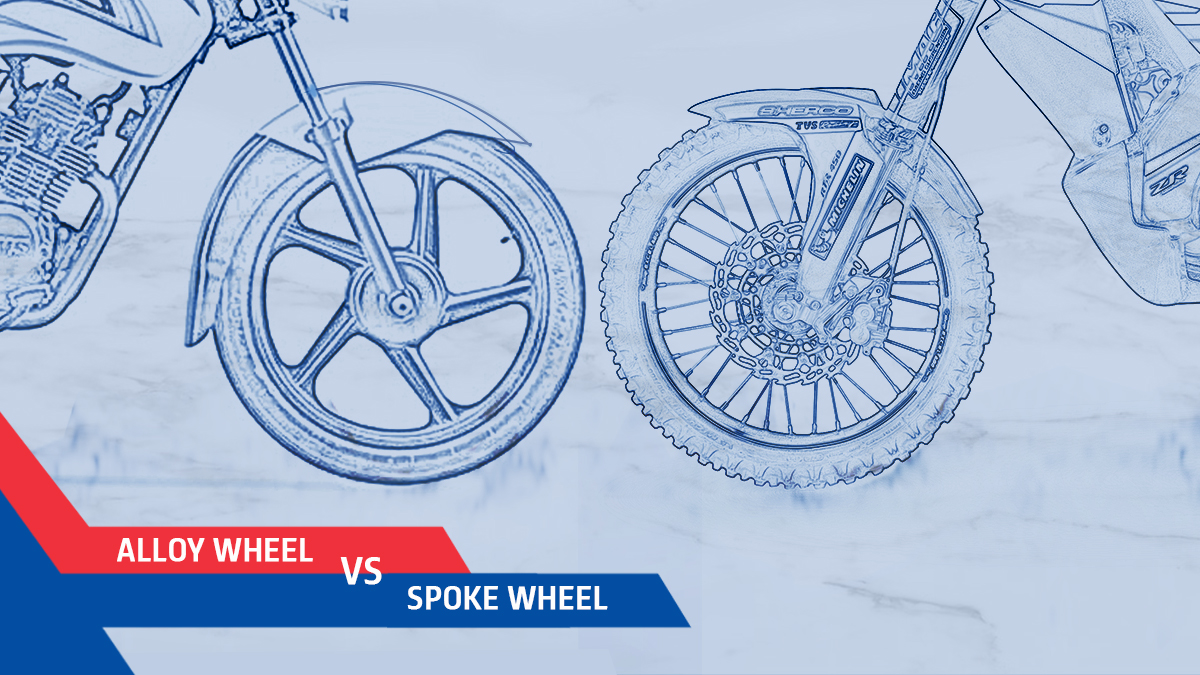Alloy wheels, also popularly and as a generic term, somewhat inappropriately called as ‘mag-wheels’ colloquially have been finding their way on a wide majority of Indian two-wheelers. They look good, and in most cases, they cost more too than spoke wheels – but apart from these two very apparent differences, do they affect a two-wheeler’s ability in any way? Well, there sure are specific advantages and disadvantages associated with both varieties of wheels, and we’ll try to clear the air about the same in this piece. Let’s get going.
Alloys Wheels VS Spoke Wheels – The Difference in Construction
To start off, an alloy wheel is made of a single metallic block, unlike a spoke wheel which comprises of a rim connected to a hub with the help of several wire spokes. While alloy wheels are made of, lightweight alloys, spoke wheels often (but not always) are made of steel. This generally makes alloy wheels lighter than spoke wheels.
An alloy wheel is often made of a metal alloy which is light weight, yet strong enough to endure the stress from all directions when a two-wheeler treads a surface. The metal used in the construction of an alloy wheel generally comprises of aluminium or magnesium, where the former metal is used for relatively less expensive wheels, and the latter is utilised to create ultra-light wheels for racing purposes, and costs a lot more.
An alloy wheel can either be cast or forged. A cast alloy wheel is made by pouring molten alloy into a pre-fabricated cast, and allowing it to cool. Once the metal cools down, the cast is detached to remove the newly cast wheel within. Another variety of alloy wheels, which is more expensive, stronger, lighter, and meant for high performance two-wheelers, is termed as a forged alloy wheel. This variety of wheels is carved out of a solid, pressurised, hi-strength slab of metal with the help of a CNC machine. The resultant wheel is very strong and lightweight and has its applications in racing and hi-performance motorcycles. Needless to say, forged alloy wheels are way more expensive than their cast alloy wheel counterparts.
Unlike an alloy wheel, a spoke wheel is typically (though not always) made of steel, which is heavier. The outer rim of this wheel is connected with the inner hub with wired spokes. The construction of an alloy wheel can be highly automated, though spoke wheels require some amount of human inputs as they’re made of multiple components.
Alloy Wheels – Advantages
While there can be exceptions to this, generic alloy wheels are lighter than generic spoke wheels, as they make use of lighter metals in their construction. They are sturdier, have less flex and are a great choice for street and track motorcycles owing to their rigidity. Motorcycles with alloy wheels would typically feel tauter and offer better dynamic ability. Alloy wheels being lighter, also reduce the un-sprung weight of the machines they’re fitted on, improving their road-holding.
Alloy wheels also look sleeker and sharper, and can be presented in countless designs to go with the rest of the bike’s shape. The process of casting or forging can also be automated and mechanised which makes their production fast, and free of human interference and errors. Finally, alloy wheels almost universally allow a fitment of tubeless tyres on them, which brings all the advantages of a tubeless tyres like better stability, cooler running and easier puncture repair to the mix.
Alloy Wheels – Disadvantages
To start off, they are generally more expensive than spoke wheels, owing to the higher quality materials used in their construction. Relatively less flexibility also makes them less suitable for off-road usage where spoke wheels offer better absorption of bumps and are less prone to breaking. Also, unlike spoke wheels which can be repaired to an extent, an alloy wheel once bent or broken has to be entirely replaced.
Also Read: Helmet Safety Ratings, What Do They Encompass; DOT, ECE and Snell Explained
Spoke Wheels – Advantages
Spoke wheels aren’t as stiff as alloys. This flexibility makes them better suited for off-road use. They don’t break easily, and even if a spoke or two goes bust, the rider has the option to carry on for some distance, and even get the spokes repaired in some cases. That’s the reason why you’ll see some of the most serious off-roading motorcycles, and MX machines wearing those spokes instead of those snazzy alloys.
As we mentioned before, spoke wheels are cheaper than alloys, and have an old-worldly charm about them, which makes them a compelling choice for the makers of retro styled machines.
Also Read: Benefits Of Biking: 10 Points That Prove Biking Is A Form Of Therapy
Spoke Wheels – Disadvantages
They’re an old design, are heavy, and not the best option for modern motorcycles which need to travel fast on tarmac. They can also be a pain to clean owing to the narrow space available between the adjoining wired spokes.
So those were the pros and cons of alloys VS spoke wheels. Got some points of your own to add? Do share them with us through the comments section below. Ride safe!


